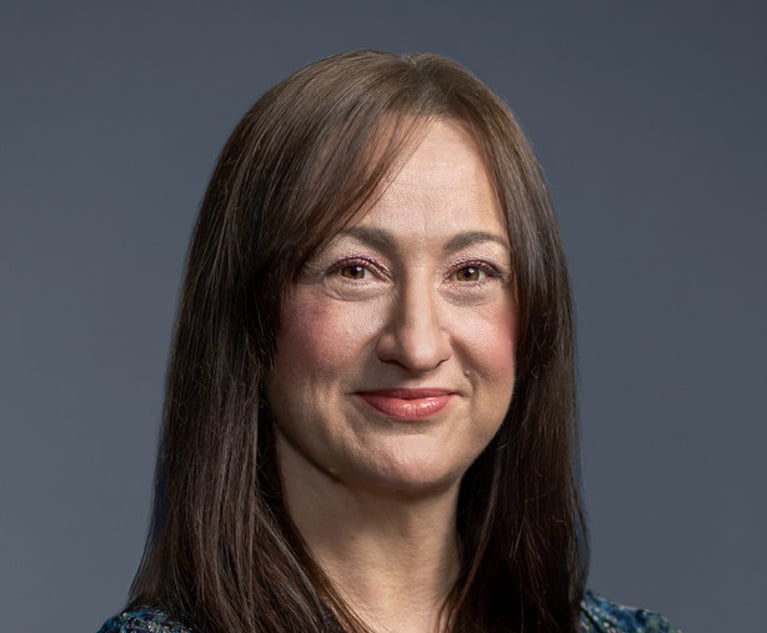SRA attempts to clear up confusion over misconduct reporting amid rise in sexual harassment claims
Regulator launches consultation to clarify what - and when - law firms are required to report
August 01, 2018 at 07:01 PM
4 minute read
The Solicitors Regulation Authority (SRA) is attempting to clear up confusion over the reporting of misconduct, with a wide-ranging consultation aimed at clarifying what – and when – law firms are required to report.
The consultation follows what the SRA calls "widespread confusion" among firms over pinpointing exactly when they are required to report a potential breach – whether in its earliest stages, or only after firms have determined that regulatory misconduct has occurred.
The consultation states: "In recent discussions with firms and individuals around the use of non-disclosure agreements (NDAs), it has become clear that understanding of when their duty to report a potential breach is triggered can differ.
"We want to make sure there is greater clarity about this issue, so all firms better understand their regulatory obligations over what, and when, they should report."
"The purpose of the consultation is to bring clarity over what the regulations are," said SRA executive director Crispin Passmore, who denied the move was solely prompted by the recent spate of sexual misconduct allegations at major law firms.
"There has been some debate around this for a while – and it's not just been around the sexual misconduct/NDA issue," Passmore said. "There was widespread confusion about what the [reporting] obligation was. The core objective here is to come to a set of drafting [of rules and guidance] that we're comfortable with."
Recent months have seen a raft of major law firms thrust into the headlines following allegations of sexual misconduct. The SRA has been looking into Baker McKenzie's handling of a historic sexual harassment allegation involving a senior partner, while Quinn Emanuel Urquhart & Sullivan referred itself to the regulator in response to allegations of inappropriate behaviour by now-dismissed City litigation partner Mark Hastings.
Earlier this year, the SRA warned law firms against using NDAs to prevent the reporting of professional misconduct within their own businesses, while the Equality and Human Rights Commission told the magic circle firms it could take legal action if they fail to take appropriate action to prevent and respond to sexual harassment in the workplace.
Nevertheless, SRA chief executive Paul Philip echoed Passmore's point: "The NDA stuff was never the driver for the consultation," he said, emphasising the 12,000 complaints the SRA receives annually. "There is a mammoth unseen. Of the 12,000 complaints received a year – a figure which has remained roughly stable – we take action on just a few hundred.
"The consultation is not here to reduce the number of complaints, but to clarify when it is law firms should be reporting to us. Some law firms think it is only when misconduct has occurred. But it's our job to decide misconduct, not firms. We've got powers and information they haven't, be that to investigate or to retrieve information."
On the question of whether the bigger issue is one of overreporting by firms rather than underreporting, Philip said it is likely that certain issues remain underreported. "The issue here is when [a breach] should be reported – and that's why we're putting out this discussion document."
As to what the SRA plans to do following the consultation, Passmore said the regulator was aiming to refine its code, "so that the wording is clearer". Philip added: "The goal here is to develop a more mature relationship with law firms – mature in terms of protecting the public and also the interests of firms. We want to highlight to firms that they should recognise their obligations, and that if they have a concern they can raise it with us."
This consultation is open from today (2 August) until 27 September.
This content has been archived. It is available through our partners, LexisNexis® and Bloomberg Law.
To view this content, please continue to their sites.
Not a Lexis Subscriber?
Subscribe Now
Not a Bloomberg Law Subscriber?
Subscribe Now
NOT FOR REPRINT
© 2025 ALM Global, LLC, All Rights Reserved. Request academic re-use from www.copyright.com. All other uses, submit a request to [email protected]. For more information visit Asset & Logo Licensing.
You Might Like
View All
MoFo Launches in Amsterdam: Exclusive Interview with Global Chair Eric McCrath
2 minute read
Clifford Chance Boosts Private Credit Offering With Mayer Brown Partner Duo
2 minute read

Ex-Mayer Brown Corporate Lawyer Leads Race for German Chancellor in Snap Election
4 minute readTrending Stories
- 1Western NY Justice Agrees to Public Admonishment Over 'Obvious' Conflict of Interest
- 2How to Litigate Before the EU’s Top Court, the European Court of Justice
- 3After Solving Problems for Presidents, Ron Klain Now Applying Legal Prowess to Helping Airbnb Overturn NYC Ban
- 4Attorneys Allege Contract Broken for Sharing $13M in Fees From MDL
- 5ZwillGen Acquires Lawyers, Scientists and Technology from Luminos.Law, Developer of Luminos.AI Platform
Who Got The Work
Michael G. Bongiorno, Andrew Scott Dulberg and Elizabeth E. Driscoll from Wilmer Cutler Pickering Hale and Dorr have stepped in to represent Symbotic Inc., an A.I.-enabled technology platform that focuses on increasing supply chain efficiency, and other defendants in a pending shareholder derivative lawsuit. The case, filed Oct. 2 in Massachusetts District Court by the Brown Law Firm on behalf of Stephen Austen, accuses certain officers and directors of misleading investors in regard to Symbotic's potential for margin growth by failing to disclose that the company was not equipped to timely deploy its systems or manage expenses through project delays. The case, assigned to U.S. District Judge Nathaniel M. Gorton, is 1:24-cv-12522, Austen v. Cohen et al.
Who Got The Work
Edmund Polubinski and Marie Killmond of Davis Polk & Wardwell have entered appearances for data platform software development company MongoDB and other defendants in a pending shareholder derivative lawsuit. The action, filed Oct. 7 in New York Southern District Court by the Brown Law Firm, accuses the company's directors and/or officers of falsely expressing confidence in the company’s restructuring of its sales incentive plan and downplaying the severity of decreases in its upfront commitments. The case is 1:24-cv-07594, Roy v. Ittycheria et al.
Who Got The Work
Amy O. Bruchs and Kurt F. Ellison of Michael Best & Friedrich have entered appearances for Epic Systems Corp. in a pending employment discrimination lawsuit. The suit was filed Sept. 7 in Wisconsin Western District Court by Levine Eisberner LLC and Siri & Glimstad on behalf of a project manager who claims that he was wrongfully terminated after applying for a religious exemption to the defendant's COVID-19 vaccine mandate. The case, assigned to U.S. Magistrate Judge Anita Marie Boor, is 3:24-cv-00630, Secker, Nathan v. Epic Systems Corporation.
Who Got The Work
David X. Sullivan, Thomas J. Finn and Gregory A. Hall from McCarter & English have entered appearances for Sunrun Installation Services in a pending civil rights lawsuit. The complaint was filed Sept. 4 in Connecticut District Court by attorney Robert M. Berke on behalf of former employee George Edward Steins, who was arrested and charged with employing an unregistered home improvement salesperson. The complaint alleges that had Sunrun informed the Connecticut Department of Consumer Protection that the plaintiff's employment had ended in 2017 and that he no longer held Sunrun's home improvement contractor license, he would not have been hit with charges, which were dismissed in May 2024. The case, assigned to U.S. District Judge Jeffrey A. Meyer, is 3:24-cv-01423, Steins v. Sunrun, Inc. et al.
Who Got The Work
Greenberg Traurig shareholder Joshua L. Raskin has entered an appearance for boohoo.com UK Ltd. in a pending patent infringement lawsuit. The suit, filed Sept. 3 in Texas Eastern District Court by Rozier Hardt McDonough on behalf of Alto Dynamics, asserts five patents related to an online shopping platform. The case, assigned to U.S. District Judge Rodney Gilstrap, is 2:24-cv-00719, Alto Dynamics, LLC v. boohoo.com UK Limited.
Featured Firms
Law Offices of Gary Martin Hays & Associates, P.C.
(470) 294-1674
Law Offices of Mark E. Salomone
(857) 444-6468
Smith & Hassler
(713) 739-1250








